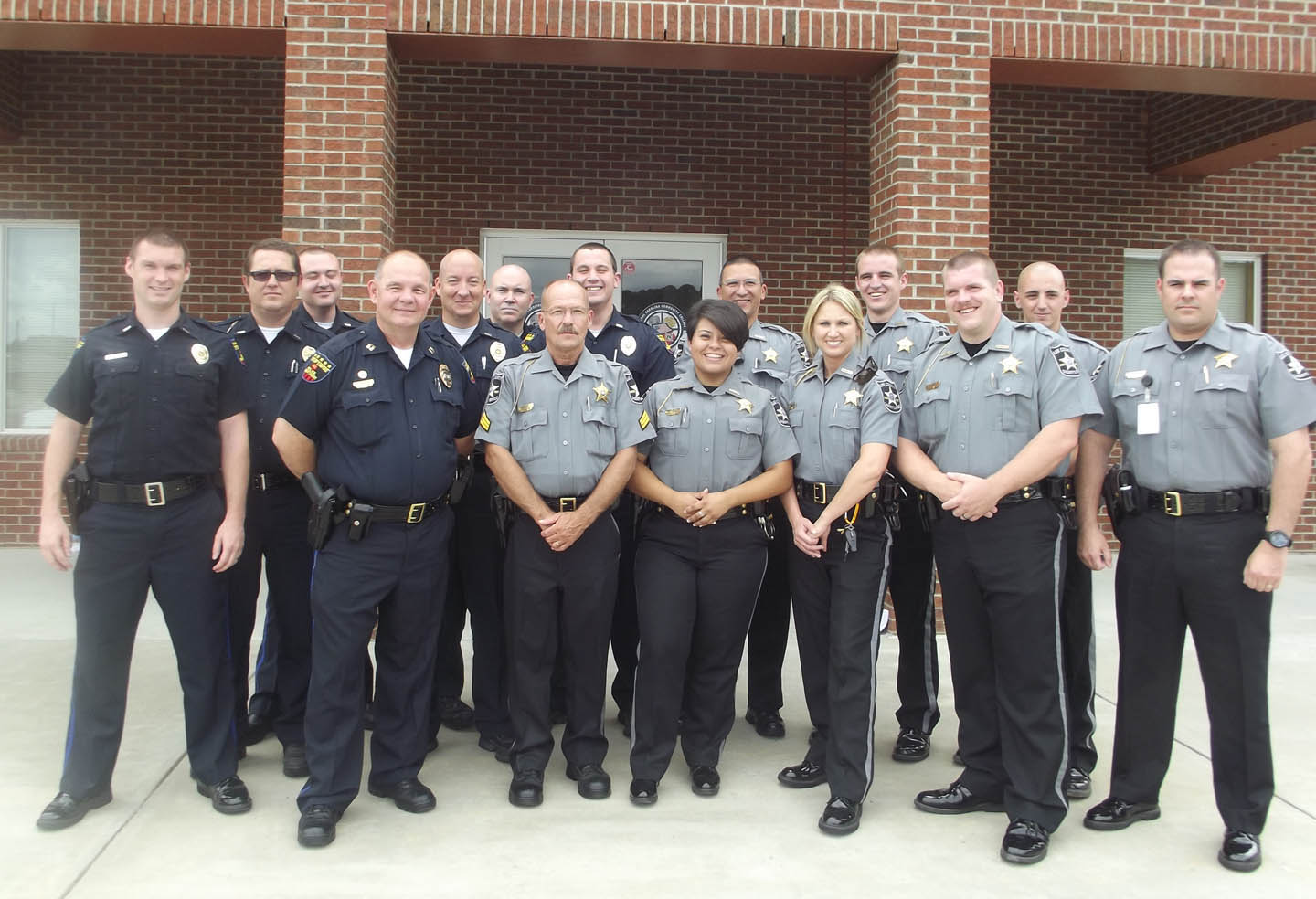College News
Law officers graduate Crisis Intervention Training
Notice: This article is older than 12 months. Names, contact information, programs, titles, etc. might have changed. If you have any problems please call the main college number, 1-800-682-8353, and we will be happy to direct you accordingly.

click image to enlarge ⊗
Fourteen Sanford and Lee County law enforcement officers learned how to deal with people in crisis ... (more)
08.19.2014 • College & Community • College General
SANFORD - Post-traumatic stress disorder, bipolar disorder, schizophrenia, autism - today's law enforcement officer deals with a great deal more than just criminal behavior.
On July 25, 14 Sanford and Lee County law enforcement officers learned how to deal with people in crisis through Crisis Intervention Team (CIT) training, taught by the N.C. Crisis Intervention Team of Lee County.
The training, at Central Carolina Community College's Emergency Services Training Center, brought together mental health experts from a variety of fields, including substance abuse, psychopharmacology, commitment law, family counseling, personality disorders, and others, to teach the program.
The 40-hour course taught the officers how to ensure the safety of individuals with mental health disorders, how to de-escalate volatile situations, special concerns with adolescents, managing stress, mental health emergencies, and more.
The CIT training course is a major collaborative effort among Central Carolina Community College, LeeCAN-Mental Health Partners, Lee County Public Health Department, Sandhills LME/MCO, Sanford Police Department, Lee County Sheriff's Office, Broadway Police Department, Central Carolina Hospital, Lee Harnett Family Support, and the National Alliance on Mental Health (NAMI) of Cumberland, Harnett and Lee counties.
Following the training, the following officers graduated at a special ceremony held at the ESTC: Megan Turnmire, Manuel Torres, Kevin Spivey, Jacob Holly, Steve Freeman, Chris Thompson, Yanira Vanegas, and Eddie Truelove, all of the Lee County Sheriff's Office; and Greg Deck, Frederick Chandler, David Jones, Brentley Brown, Benson Wise and Stephen Caviness, all of the Sanford Police Department.
Kirk Smith, vice chair of the Lee County Board of Commissioners, delivered the commencement address.
"More than 16 percent of the people incarcerated have a mental illness," Smith said. "Law enforcement is often the first responder to situations in which there are mental health issues. With crisis intervention training, these issues can be addressed much more quickly and safely. Specific training in mental health areas enhances a community's policing efforts and decreases the danger for officers."
Lee County Sheriff's Deputy Yanira Vanegas is assigned to schools in Lee County.
"Although this training is not a requirement, it is very helpful for my job because I work with a lot of students with mental health issues," Venegas said. "Not everyone you deal with is a criminal. Some have mental health problems that need to be addressed within the schools, not in jail."
CIT training makes law enforcement much more aware of the many mental health problems in the larger community, she added. "It also gives you knowledge of techniques in handling mental health situations and the resources out there that allow you to help people."
Sanford Police Officer Ben Wise, a senior patrol officer, said he encounters a number of situations in which PTSD is involved.
"We're having a large influx of people with the disorder from overseas," Wise said. "I think every officer should have to take this course. It helps you to recognize the part illness plays in dangerous situations. It is most helpful. I recommend it."
Sheriff's Deputy Kevin Spivey also works in the school system with students who have disabilities ranging from attention deficit disorder to severe autism.
"The course has been like a small community meeting," Spivey said. "You have different experts from different fields all here at one time. It's good to get their ideas and to bounce your own ideas off the instructors. It's also beneficial to get feedback on what you are doing right or wrong. It is a proactive rather than a reactive approach to handling situations."
Victoria Whitt, CEO of Sandhills Center MCO/LME, a behavioral health managed care organization that covers nine North Carolina counties, said CIT initiatives are available to law enforcement personnel in all those counties. The Center also provides Mobile Crisis Teams in the nine-county region as a support to law enforcement and persons in crisis situations.
"It is imperative for law enforcement officers to know how to deal with citizens experiencing a behavioral health crisis," she said. "These graduates today now know to call Sandhills Center or the Mobile Crisis Team in a behavioral health emergency."
For more information on the Crisis Intervention Team Training course, contact LeeCAN at 919-718-4640, ext. 5314, or visit LeeCAN@leecountync.gov. For more information about law enforcement training at CCCC, visit www.cccc.edu.
Categories
- Admin, Faculty & Staff Category
- Arts & Entertainment Category
- Clubs Category
- College & Community Category
- College General Category
- Continuing Education Category
- Curriculum Programs Category
- Distance Education Programs Category
- Facilities/Buildings Category
- Finances Category
- Foundation Category
- Graduations Category
- Lee Early College Category
- NCCCS Category
- SGA Category
- Special Events Category
- Sports Category
- Students/Graduates Category
- Uncategorized Category
Archives

